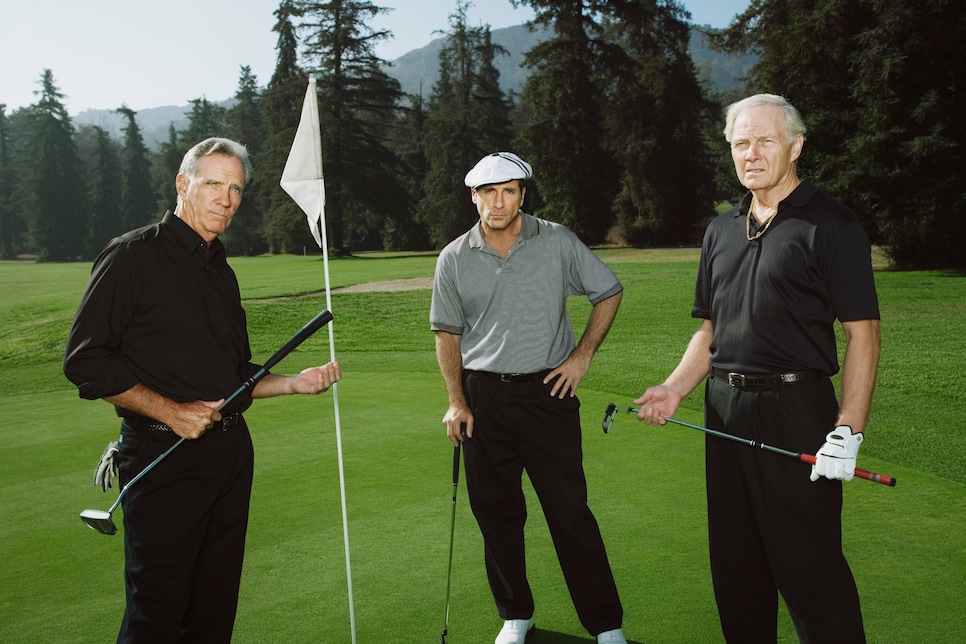When anger goes too far: 10 rules for avoiding an on-course blowup
MENTAL GAME
When anger goes too far: 10 rules for avoiding an on-course blowup

Writing for a living sometimes means telling embarrassing stories about yourself. But I'll be honest, this one is tough. What makes it so hard is that I thought I was over my golf anger phase. When I got back into golf earlier this year—long story short, I picked up tennis in 2015, but then I tore my ACL, which eventually led me back to golf this year—I discovered that I was a calmer person.
Until the morning in question. It was a Thursday about a month ago, and I was set to play in a two-day, Ryder Cup-style competition with 15 friends. I had worked hard on my 3-wood the preceding month and was in a place where I was routinely hitting lovely, 230-250-yard shots with a slight draw. Then, in an experience familiar to every recreational golfer, it all went to hell, and it happened at the worst possible time.
I came out that morning hoping to fix it on the course (bad plan, I know), but I had a few outside factors working against me. First, a daunting work project had introduced a good deal of stress in my life. Second, my infant daughter was just learning to sleep on her own and waking up four to five times each night. I arrived at the course that morning tired and frustrated, a raw nerve disguised as a human being. On the first two holes, I hooked my 3-wood. On the third hole, I hooked it again, then asked my playing partners to hold tight while I tried another. I hooked that one, too, and suddenly the rage was too much. I snapped the club over my knee.
As I threw the broken shaft in the garbage can, shame flooded my brain. I decided there was nothing to be gained the rest of the day, and what I really needed was to go home and sleep. It was the right move for my own sanity, but I was abandoning my group mid-round. One of my playing partners was a very good friend—we had shared plenty of embarrassing moments together, and this wouldn't be more than a blip on the radar—but the other was more of a potential good friend, someone we hadn't seen in a while. Well, so much for that. I have since texted my apologies, and he hasn't responded. I don't blame him one bit.
The weekend worked out better for me than I deserved. At a party that night, I told the story, and it turned out that another friend had my exact 3-wood in his garage. He gave it to me, I solved the problem the next morning on the range, and the weekend was a success. Still, it's hard to shake the sheer agony of that ugly memory, and in the weeks since, I've come up with a set of rules designed to (hopefully) prevent anything like that from happening again. With the hope that they can help you too, here are the 10 golf course rage rules.
1. Allow yourself *some* anger—obey the five-second rule

ER Productions Limited
Assuming you're not a living saint and have not attained nirvana, you should accept the fact that anger is going to bubble up on the golf course if you care about the state of your game. It's a natural emotion, and it needs an outlet. Keeping anger to yourself only allows it to fester and results in bigger blow-ups down the line. So by all means, if you hit a bad shot, chastise yourself, swear if you're in safe company, and bemoan the gods. But keep it to five seconds—after that, let it go, and let it go for good.
2. Contain the anger: Be Jordan Spieth

Matthew Lewis/R&A
It may have occurred to you, reading the last rule, that I technically obeyed the five-second rule when snapping my 3-wood. That's true, which means that the expression of anger needs limits. Weird as it may sound, the person that always comes to mind when I get mad is Jordan Spieth. We've all heard the words "Oh, Jordan" after a shot he doesn't like, and what I like about it is that it's more of an expression of disappointment and mild frustration than sheer anger. I channel him after a bad shot, and I find that "come onnnn," or even a very mild curse is a strangely effective mantra.
3. Direct your anger outward, not inward

Charles McQuillan
It's common to treat your athletic self as two distinct entities: One person who plans the shot, the occasionally controlling and narcissistic ego, and another intuitive, silent self who executes it. Then the first entity to berate the second after a bad shot. "You ******* moron, Shane!"
This is not helpful, because it sets us at war with ourselves, and I'd argue that it's worse to do this in golf than any other sport. But if you start from the premise that every part of you is trying its best, you would no more yell at yourself than you would yell at a kid who makes a mistake (if you yell at kids for making mistakes, please stop). Direct your anger outward, at the outcome rather than the person, and keep it brief.
4. Remember the rule above … but don’t direct it outward at your playing partners

Jupiterimages
This one's simple: There's no excuse for ruining someone else's day. Trust me, it's the thing you'll regret most.
5. Commit to not whining
Speaking of Spieth, one of his great battles in 2014, before he became a major winner, was to avoid getting so far down on himself that he entered a negative feedback loop. It happened in the final round of the Players Championship, the Masters, and in his Sunday singles session at the Ryder Cup. He overcame it, and he did it as a 21-year-old. You can, too.
When you start to feel like bad luck is mounting, or your game is fundamentally broken, and you get the urge to start complaining about it to your partner or even inside your own head, shut it down. (Despite the 3-wood incident, this remains my biggest battle.) It becomes a self-fulfilling prophecy—unlike No. 3 above, which pits you against yourself, this pits you against the universe, an equally tough opponent—and does nothing to solve the two biggest issues: Your mental state, and the quality of your game.
6. See trouble as an opportunity: Be Seve Ballesteros

David Cannon
Tony Jacklin once told Seve, possibly the best scrambler to ever play the game, that golf was much simpler when you played it from the fairway. Seve's response was enigmatic, but wonderful: "But you don't understand, Tony."
What he was trying to convey was that recovery was a key facet of his style, and without that fundamental conflict, he wouldn't be himself. It excited him—he once won an Open hitting out of a parking lot. To him, trouble off the tee was just an excuse to get creative, and if you adopt that mind-set—I topped the ball into the hazard in front of me … okay, let's see if I can give myself a bogey putt—you can strategically circumvent anger. It also leads to terrific moments on the course in the context of a hole. A bogey after a three-putt is disappointing; a bogey after going OB off the tee is a triumph.
7. Understand your mental state at the start of the round
I knew from the moment I woke up that Thursday that I shouldn't have been playing, and maybe I should have stayed home. F-that. The better outcome would have been to lower my expectations and frame the day as a chance to prove that even if I was frustrated and terrible, I could finish the round and be a pleasant playing partner. Instead, I chose to play and have a meltdown.
If I had been more conscious of how I felt that morning, and how life felt outside the course, I could have prevented everything that happened. Anger on the golf course is almost always about something beyond golf: Be attuned to whatever that is, and be realistic about it.
8. Avoid cliches that don't help you
There are two things people love to say when you get mad on a golf course. The first is something like, "Hey, none of us are pros here," and the other is "just enjoy being outside on a beautiful day."
These statements are technically correct—we are recreational golfers, and it is a privilege to be outside playing a game—but they are also useless bromides and are sometimes deployed passive-aggressively. Part of playing a sport, no matter how good you are, is improving, and caring about the results, and, for many of us, being competitive even within the context of our own limited skill-sets. That's nothing to be ashamed of—if we start rating what should and shouldn't be significant to us in life, we could quickly arrive at some unhappy conclusions—and trying to stifle your desire to play well is only going to lead to worse anger. Manage expectations, but don't suppress them, or you'll do nothing more than add guilt to the toxic anger brew.
9. Know that it will stop mattering: Weather the storm

Icon Sportswire
This may seem contradictory to the point above, but it's meant in a positive way. If I had managed to control myself on the third hole a month ago, to let the peak of the anger wash over me, I can guarantee you that today I wouldn't think about that morning at all. The hooked shots would be a faded memory, and the round would have blended into a thousand other rounds like it. The only reason I think of it now is that I wasn't strong enough to experience the rage and not react. None of the anger you feel on the golf course, no matter how extreme, will last—that's the good part of not relying on the game for a living. The knowledge that it goes away, and quickly, can help in the moment. In about 15 seconds, you'll be glad you didn't snap your 3-wood.
10. If you lose it, forgive yourself

Kohjiro Kinno
Assuming you don't hurt another person physically or emotionally, or do the same to yourself, understand anger management as a journey, and if you have a misstep along the way, let it go. There are worse things in life than a little embarrassment, and most people will understand.
A lot of us have been there. And whatever you do, never write a therapeutic 1,800-word internet guide if you're the kind of idiot who broke a club a literal month earlier. I mean ... who do you think you are?


No comments:
Post a Comment